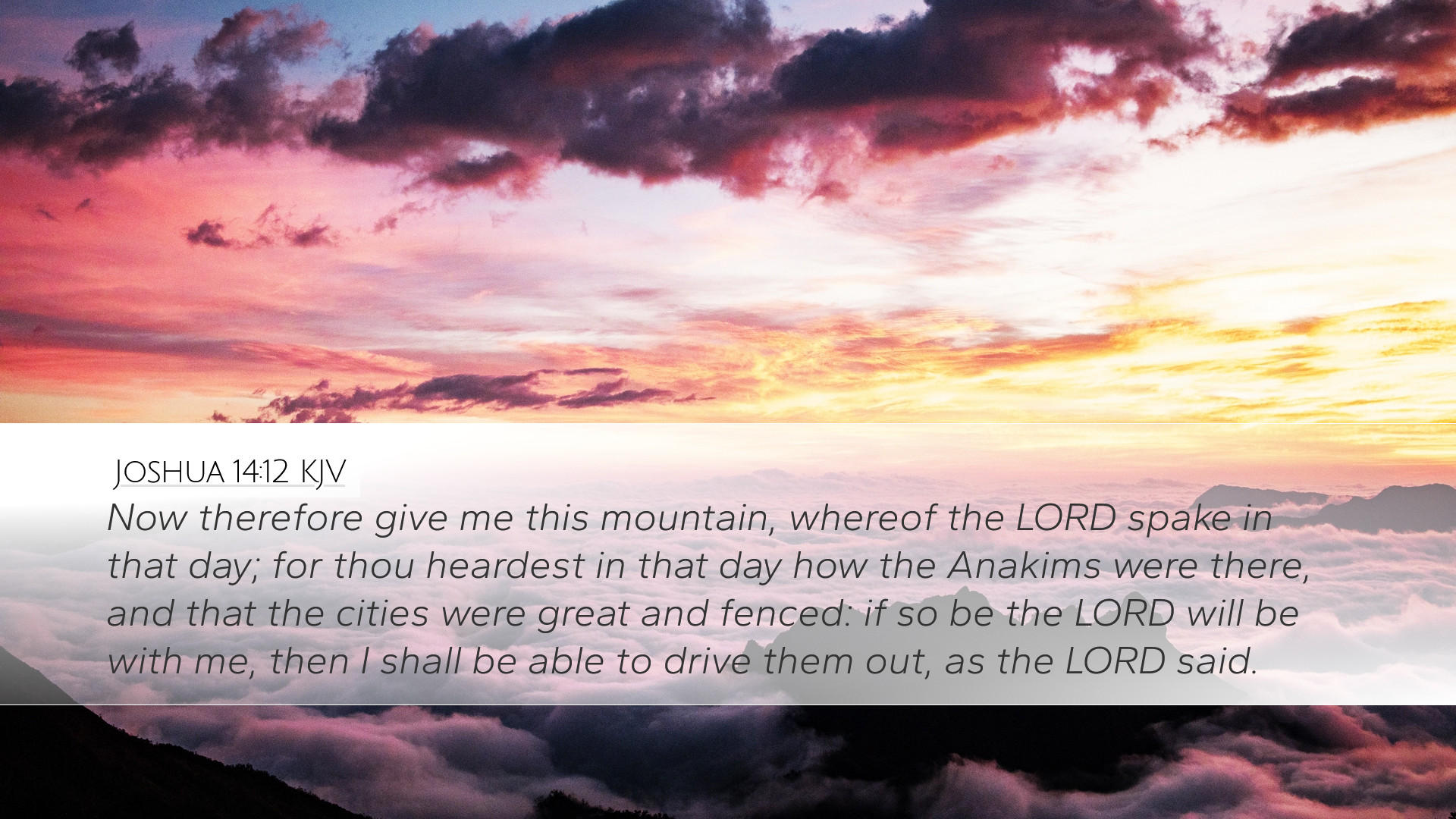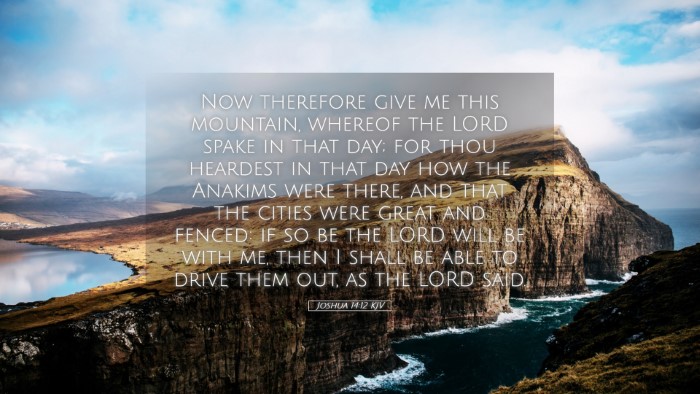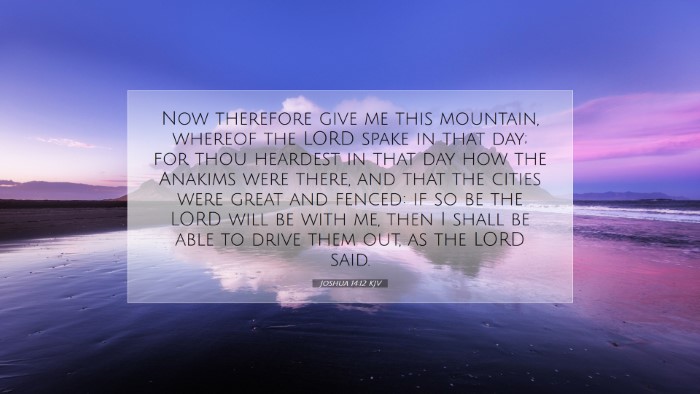Old Testament
Genesis Exodus Leviticus Numbers Deuteronomy Joshua Judges Ruth 1 Samuel 2 Samuel 1 Kings 2 Kings 1 Chronicles 2 Chronicles Ezra Nehemiah Esther Job Psalms Proverbs Ecclesiastes Song of Solomon Isaiah Jeremiah Lamentations Ezekiel Daniel Hosea Joel Amos Obadiah Jonah Micah Nahum Habakkuk Zephaniah Haggai Zechariah MalachiJoshua 14:12
Joshua 14:12 KJV
Now therefore give me this mountain, whereof the LORD spake in that day; for thou heardest in that day how the Anakims were there, and that the cities were great and fenced: if so be the LORD will be with me, then I shall be able to drive them out, as the LORD said.
Joshua 14:12 Bible Commentary
Commentary on Joshua 14:12
Joshua 14:12 states: "Now therefore give me this mountain, whereof the Lord spake in that day; for thou heardest in that day how the Anakims were there, and that the cities were great and fenced: if so be the Lord will be with me, then I shall be able to drive them out, as the Lord said." This verse reveals the faith and determination of Caleb, a faithful servant of God, as he approaches Joshua to claim the land promised to him.
Contextual Background
To fully appreciate this request, we must consider the historical and theological context of this passage. Caleb, alongside Joshua, was one of the original spies sent into Canaan. Unlike the other spies who reported fear and doubt, Caleb exhibited faith in God’s promise. The implications of his request for the mountain highlight the themes of faith and God’s faithfulness in fulfilling His promises.
Insights from Commentaries
Faith in God's Promises
According to Matthew Henry, this request is a clear declaration of Caleb's unwavering faith in God. He states that Caleb not only remembers the promises made to him but also boldly claims them. Henry notes that Caleb's approach reflects complete trust in God’s ability to enable him to overcome the giants in the land: the Anakims, who were known for their size and strength.
"Caleb's spirit was undaunted, and his plea was fervent," writes Henry, suggesting that true faith often requires believers to confront overwhelming obstacles with confidence in God’s word.
The Significance of the Mountain
Albert Barnes elaborates on the symbolic significance of the mountain. He suggests that the mountain represents both a physical and spiritual challenge. For Caleb, it was not merely about possessing a piece of land but fulfilling the divine mandate given to him. His request embodies a deep yearning for the reward of promised faithfulness amid trials.
Barnes adds that Caleb's declaration of "this mountain" indicates a personal connection and commitment to the land, affirming that every believer should take ownership of God's promises and pursue them diligently.
Confronting Giants
Adam Clarke comments on Caleb’s mention of the Anakims, emphasizing the reality of the giants in the land. He argues that Caleb's faith does not ignore the challenges he faces but rather confronts them head-on, equipped with the assurance of God’s presence. Clarke suggests that Caleb knows the hardships that lie ahead but trusts that if God is with him, victory is assured.
Clarke points out that the text encourages believers to face adversities with courage, knowing they do not combat these challenges in their strength but by relying on divine support. This is a crucial principle for pastors and theologians to impart to their congregations.
Theological Implications
This verse illustrates several important theological implications that are relevant to both scholars and practitioners:
- Divine Promises: It reinforces the belief that God faithfully fulfills His promises to His people. Faithful believers may claim God's promises even in the face of seemingly insurmountable challenges.
- Personal Responsibility: Each individual is called to actively seek and claim the blessings of God, suggesting a partnership between divine sovereignty and human agency.
- The Reality of Spiritual Conflict: The mention of the Anakims serves as a reminder of the spiritual battles that believers will face. However, with faith and reliance on God, victory is attainable.
Practical Applications
As we reflect on Joshua 14:12, there are several applications for those in ministry, study, and theological pursuit:
- Encouragement in Trials: Like Caleb, individuals may encounter fears and giants in their lives. Believers are encouraged to stand firmly in their faith and trust God's promises.
- Passion for God's Word: Engage deeply with Scripture and internalize the promises of God. This will inspire believers to maintain faith even when circumstances suggest otherwise.
- Discipleship and Community Support: Remind congregations that they are not alone in their struggles. Community can bolster faith, encourage collective claims to God’s promises, and provide support in confronting life's giants.
Conclusion
Joshua 14:12 encapsulates a powerful moment of faith, determination, and divine promise. The insights from public domain commentaries provide various angles from which to appreciate the depth of Caleb's character and his relationship with God. For pastors and theologians, this passage serves not only as a historical account but as an ongoing challenge to trust in the Lord for the mountains before us, recognizing His presence and potential for victory in our Christian walk.


